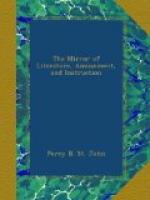79. The Maid of Judith waiting outside the tent of Holofernes, till her Mistress had consummated the deed that delivered her country from its invaders: a wonderful production, by Etty.
84. Scene near Hastings. Rev. T. J. Judkin.
86. Interior of a Highlander’s House—very fine. Edwin Landseer.
105. Portrait of Miss Eliza Cooper—a chaste and highly-finished production, by Sir M. A. Shee.
Messrs. Pickersgill, Turner, Reinagle, Hilton, Newton, Constable, Good, Daniell, Clint, Kidd, Howard, Phillips, and Elford, have also some excellent pictures in the exhibition.
May 14, 1831.
G. W. N.
* * * * *
SPIRIT OF THE PUBLIC JOURNALS
BILLINGTON.
(Print her name in grand capitals, Mr. Compositor)—Billington returned from Italy! My father, who remembered, I suspect, the beautiful woman more than the accomplished singer, determined to hear again her Mandane; and sorely against my will, I rather think to prevent the chance of my doing mischief at home, forced me to go along with him. With listless and unwilling ears I listened to her and Mrs. Mountain, that second best of English singers throughout “Fair Aurora.” Gradually, however, and involuntarily, I became pleased, interested, delighted; and when the encored “Soldier tired” was ended, had I but possessed so much Italian, “Sono anch’io Cantatore” would have burst from my lips with as much fervour and devotedness of resolution as the “Sono anch’io Pittore” of the artist. From this moment never had I three shillings and sixpence in my pocket, and either Billington’s or Braham’s name in the bills of the night, that I was not to be seen planted in the front row of the pit, looking over the leader’s book, and taking the only lessons I ever received in music. The opera over, no farce, however laughable, not even the “Turnpike Gate” with Joe Munden’s Crack, had the power to detain me in the house.—My time of imitation was arrived, and I sallied forth to alarm watchmen with the last division of the “Soldier tired,” affront my friends by saluting them with “Adieu thou dreary pile,” or annoy my father with shouting “The Austrian trumpet’s loud alarms” at a moment when, with all the fervour of true John Bull anti-gallicanism, he was lamenting over Ulm and Austerlitz; execrating Mack, pitying Francis and Alexander, and cursing the victorious Napoleon by all his gods.—Harmonicon, No. 41.
* * * * *
SUFFICING REASONS FOR SHAKING.
At a charity concert, given some time since in the sister island, one of the reverend directors, or stewards, was shocked at a long shake made by a juvenile chorister in the passage “and they were sore afraid” in the Messiah, and remonstrated with the boy’s instructor on the impropriety of such an ornament to such words.




